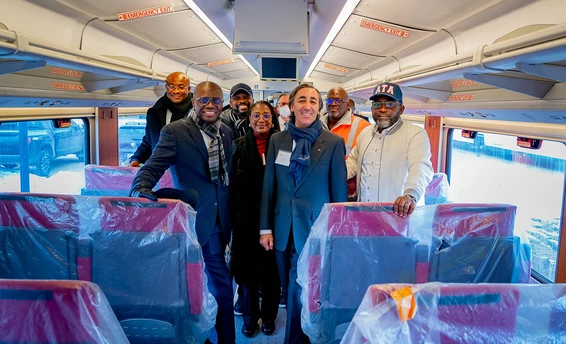There are no products in your shopping cart.
| 0 Items | £0.00 |


GOVERNOR Babajide Sanwoolu has entered into a pact with Spanish train manufacturer Talgo involving the company supplying the Lagos State government with two sets of trains for its proposed urban metro network.
Visiting the company's US factory at Milwaukee in the state of Wisconsin, Governor Sanwoolu struck a deal to purchase two trains that were originally built for local use. At a public event at Talgo's local facility, Milwaukee's acting mayor Cavalier Johnson welcomed Governor Sanwoolu to the city.
Mr Johnson said: "It's a little bittersweet. I'm sending my congratulations to the governor in Lagos State in Nigeria but also a little disappointed that we missed out on the opportunity to have those train sets operating here in Milwaukee and in Wisconsin."
This is the latest turn in a decade-long saga revolving around high-speed rail, which Wisconsin Public Radio previously covered in the 2019 podcast series Derailed. In 2009, Wisconsin's then governor Jim Doyle, announced a deal with Talgo for two new trains to be built and used for a high-speed rail line between Milwaukee and Madison and later that year, Wisconsin was awarded $810m for the project in a federal stimulus bill.
However, the plans died off after Republican Scott Walker became governor. By 2012, Talgo had built the trains and sent an invoice to the state for them but later that year, Talgo terminated the contract and sued the state, kicking off a court dispute that lasted almost three years.
Ultimately, under the terms of a settlement between Wisconsin and Talgo, the state paid the firm a total of $50m for the trains, which remained under the company's ownership. These trains sat unused in an Amtrak facility in Indiana for years, a lasting and were eventually returned to Talgo's plant in Milwaukee in 2019.
Governor Sanwoolu is now purchasing these trains, which shall be used on the Lagos Metro due to open in December 2022. A 35km light railway urban network, the Lagos Metro was first launched in 2009 but has suffered a series of delays, with costs spiralling out of control.
It is not yet clear how much the trains will cost or when exactly they will be delivered to Nigeria. With a population of 12m, Lagos is the largest city in the world without an urban rail metro service, leading to severe and chronic traffic jams on a daily basis.